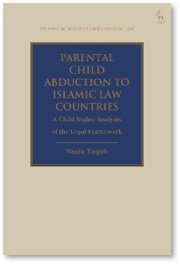Parental Child Abduction to Islamic Countries by Nazia Yaqub
This book by Nazia Yaqub is an addition to the Hart series, in which several books on international child abduction have been published. The author investigates Islamic law, discussing where relevant the history and the different schools, and the specific legal rules of the selected States that have not acceded to the Hague Child Abduction Convention (1980), as well as Morocco, which has acceded. She also examines whether the ratification of the Hague Child Abduction Convention by more States with Islamic legal systems would offer an improvement to the protection of children’s rights. The author analyses the child’s right to have their best interests taken as a primary consideration, the child’s right to be given the opportunity to be heard, and the child’s right to non-discrimination. The analysis places not only Islamic law under scrutiny but also the Hague Convention.
Besides using policy documents and international literature, she has also interviewed persons who were involved in child abductions.
The difficult discussion about the best interests of the child, including the issues that arise in this regard under the Hague Child Abduction Convention and the law in the Islamic States is presented in a nuanced way, keeping to the central theme of children’s rights. The detailed and rigorous analysis explores Islamic law, utilises case studies garnered from the empirical research and the Hague Convention. The book also sets out various models of child participation and shows how this right is only partially respected in Islamic law States and by the Hague Convention. It is argued that a child-centred approach requires separate representation for children.
The book also discusses non-discrimination, considering not only children’s rights but also other human rights instruments, especially concerning the rights of women (and girls). The author does not only consider discrimination to which children are subjected but also discrimination of mothers that directly influence children. This leads to an interesting and important analysis regarding the cultural nature of children’s rights and the reality of the relation nature of children’s rights with their mother/primary carer. Considerable thought is given to the ground for refusal in Article 20 of the Hague Child Abduction Convention. What also emerges through the analysis is the changing gendered dimension of parental abductions and the problematic issue of abduction by primary carers.
Nazia Yaqub is a lecturer in law at Leeds Beckett University, UK.
Oct 2022 | 9781509939114 | 304pp | Hbk | RRP: £85 / $115
Discount Price: £68 / $92
Order online at www.bloomsbury.com – use the code GLR AP3UK for UK orders and GLR AP3US for US orders to get 20% off!
